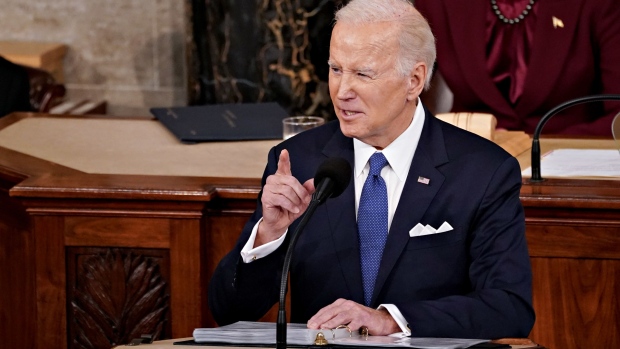Feb 8, 2023
Three Climate Takeaways From Biden’s Second State of the Union
, Bloomberg News

(Bloomberg) -- US President Joe Biden delivered his second State of the Union address to a divided Congress on Tuesday night, a speech widely seen as a test run for his reelection pitch next year. Over 73 minutes punctuated by heckles and outbursts from some lawmakers, Biden talked about issues ranging from inflation to police reform to the annoying “junk fees” added to the cost of airline tickets and hotel rooms, which he promised to crack down on.
He also talked about climate change and energy. Here were the key themes he laid out:
1. Rebuilding America’s infrastructure
Near the start of the speech, Biden touted his “once-in-a-generation infrastructure law” and cited projects that the bipartisan law will fund — such as replacing lead pipes in homes and schools — as part of a “blue-collar blueprint to rebuild America.” The president made a jab at Republicans who didn’t support that bill: “I promised to be the president for all Americans. We’ll fund your projects. And I’ll see you at the ground-breaking.”
Pivoting to the Inflation Reduction Act, Democrats’ landmark package with $370 billion in climate and clean energy provisions, Biden framed climate action as a massive building project, too, with “electric grids able to weather the next major storm. Roads and water systems to withstand the next big flood,” plus 500,000 new electric vehicle charging stations installed around the country.
Although he emphasized building with American materials, Biden didn’t single out the surge in US manufacturing of batteries, solar panels and EVs spurred by incentives in the IRA. That message risked intensifying trade tensions with European allies worried the subsidies will siphon economic activity from the EU.
Mentioning the electric grid was timely days after hundreds of thousands of Texans lost power from an ice storm. While the 2021 infrastructure bill included some $8 billion for grid improvements, a push by the White House for permitting reform, seen as truly unlocking a buildout of the transmission grid, stalled in the last Congress.
2. Climate change “an existential threat”
“Let’s face reality. The climate crisis doesn’t care if you’re in a red or blue state,” Biden said. He spoke of the damage caused by storms, floods, droughts and wildfires. The president also said he is “proud of how America is at last stepping up to the challenge.”
Despite the strides made with the passage of the IRA, though, the US is still falling short of international expectations when it comes to climate finance for vulnerable and developing countries.
3. Oil and gas still needed “for a while” but profits “outrageous”
Biden went off-script to acknowledge a reality that’s uncomfortable for the White House: “We’re still going to need oil and gas for a while.”
Slipped twice into the address and not included in prepared remarks circulated beforehand, the comments lay bare the conflict between his administration’s climate and economic goals. Biden has repeatedly exhorted oil companies to invest in pumping more crude even as he seeks to end its use.
The world needs to curb greenhouse gas pollution rapidly — including by switching over to zero-emission energy — in order to keep global warming to 1.5C, a critical threshold for averting the most catastrophic consequences of climate change.
In a speech where he repeatedly took aim at the wealthy and big corporations, Biden blasted oil companies for their record profits: “Last year they made $200 billion in the midst of a global energy crisis. I think it’s outrageous.” And he assailed them for using that money to buy back stock — “rewarding their CEOs and shareholders” — instead of plowing it into new drilling to increase crude production and “keep gas prices down.”
Biden said oil executives he’d pressed on the issue told him bluntly: “We’re afraid you’re going to shut down all of the oil wells and all the oil refineries anyway, so why should we invest in them?”
“We’re going to need oil for at least another decade,” Biden said, quickly adding, “and beyond that,” after boos from some lawmakers.
©2023 Bloomberg L.P.






